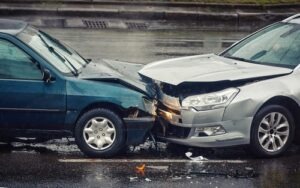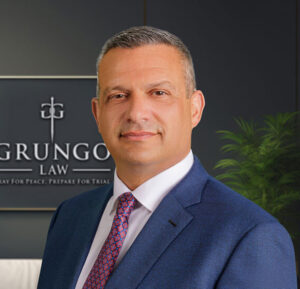PTSD After a Car Accident: What You Need to Know
Request a Free ConsultationPost-traumatic stress disorder (PTSD) after a car accident is a recognized legal injury that can upend daily life emotionally, mentally, and physically. For many in South Jersey and beyond, emotional trauma lingers well after physical wounds begin to heal.
Intrusive flashbacks, persistent anxiety, or avoiding driving altogether are more than symptoms. They’re signals that the aftermath of an accident deserves serious legal and medical attention.
With support from a South Jersey car accident attorney grounded in the local community and backed by Supreme Court certification, innovative technology, and proven results, families gain clear insight into their rights under New Jersey and Pennsylvania law.
Grungo Law is built on the promise, “If we can help, we will.” Every neighbor facing PTSD after a crash finds a team ready to listen, advise, and fight for meaningful recovery on all fronts.
To learn more about your options or take the next step, schedule a free case evaluation with car accident attorneys who combine advanced litigation strategies, technology-driven advocacy, and a neighbor-to-neighbor approach.
Key Takeaways About PTSD After a Car Accident
- PTSD after a car accident is recognized by law: Under New Jersey law, non-economic damages, including for emotional distress, are recoverable in personal injury cases (N.J.S.A. 39:6A-8).
- Signs and effects of PTSD can permeate daily life: Nightmares, anxiety, avoidance, and hypervigilance all deserve careful attention and thorough documentation in both legal and medical contexts.
- Thorough documentation is foundational: Medical and therapy records, health provider notes, and even reports from those close to you demonstrate the true impact of PTSD and strengthen the value of a claim.
- Legal guidance shapes outcomes: Supreme Court-certified trial attorneys rooted in the community and equipped with advanced legal technology can advocate for a result that reflects your lived experience, not just what insurers want to see.
- Non-economic damages reflect the full story: Recovery isn’t measured by medical bills alone. Legally supported compensation may include emotional distress, therapy costs, and the lasting impact on your quality of life.
What is PTSD and How Does a Car Crash Cause It?
 Post-traumatic stress disorder (PTSD) is a mental health condition that develops after experiencing or witnessing a traumatic event, such as a serious car accident.
Post-traumatic stress disorder (PTSD) is a mental health condition that develops after experiencing or witnessing a traumatic event, such as a serious car accident.
While physical injuries often receive immediate attention, the psychological effects can be just as disruptive. After a car accident, PTSD affects how you think, feel, and interact with others, creating challenges beyond the crash itself.
Car accidents trigger PTSD in several ways:
- The sudden impact of the crash: The unexpected and violent nature of a collision can leave a lasting emotional mark.
- Fear for safety: Feeling helpless or in danger during the accident can create intense fear that resurfaces as anxiety or flashbacks.
- Witnessing severe injuries or loss: Seeing others hurt or killed in the crash can deepen the emotional trauma.
- Ongoing stress after the accident: Medical treatments, financial pressures, and legal issues can prolong emotional distress.
PTSD symptoms often disrupt daily routines and relationships. These symptoms include:
- Intrusive thoughts and flashbacks: Vivid memories or distressing dreams that bring the accident back to life.
- Emotional detachment: Struggling to connect with loved ones or enjoy activities you once valued.
- Avoidance behaviors: Refusing to drive or avoiding places that remind you of the crash.
- Constant anxiety: Feeling on edge or easily startled, even in calm situations.
Legal professionals with experience in PTSD-related claims can help you take action. After getting into a car accident, they help gather evidence, document the psychological impact of the accident, and build a case that reflects the full scope of your experience.
With the right legal support, you can pursue compensation that addresses the crash’s financial and emotional consequences.
How Common Is PTSD After a Car Accident?
PTSD is a frequent yet often misunderstood outcome after traumatic motor vehicle collisions.
Research published in peer-reviewed journals shows that between 20% and 46% of car accident survivors experience symptoms of PTSD in the months following a crash. A
A large systematic review found the pooled prevalence to be 22% among road traffic accident survivors (National Institutes of Health).
Studies also indicate that PTSD symptoms can persist for months or even years: one longitudinal analysis found that approximately 24% to 29% of survivors still had significant PTSD symptoms 12 months post-accident, and more than half of those continued to struggle years afterwards (PubMed).
Risk factors for developing PTSD after an accident include experiencing severe injuries, witnessing a death or serious harm, having a previous trauma or mental health history, or lacking strong social support (NIH; NLM; ScienceDirect).
These statistics highlight how common and serious the psychological aftermath of a car accident can be.
If you or a loved one is experiencing symptoms of PTSD after a crash, consider speaking to a personal injury lawyer who can help fight for maximum compensation.
How PTSD Impacts Car Crash Injury Claims in NJ and PA
In New Jersey, the verbal threshold limits non-economic damages unless the injury meets specific criteria, such as permanent injury.
In Pennsylvania, limited tort policies restrict recovery unless exceptions apply, like intoxicated or commercial drivers. We navigate these rules to position your claim for success.
At Grungo Law, we use trial technology and a thorough understanding of state laws to build strong cases that reflect the full scope of your experience. We approach PTSD claims by:
- Turning experiences into evidence: Collecting therapy notes, medical evaluations, and records to clearly document emotional distress.
- Demonstrating the impact: Using technology to show how PTSD affects work, relationships, and daily life.
- Countering insurance tactics: Pushing back when insurers downplay emotional injuries, using NJ and PA laws to strengthen your claim.
Grungo Law combines trial experience with a compassionate approach to advocate for clients facing PTSD. From consultation to resolution, we focus on making your story heard and securing fair compensation.
Common Legal Challenges When There Is PTSD After a Car Accident
Claims involving PTSD and emotional trauma often face significant challenges. Insurance companies frequently question the validity of these claims, relying on doubts about invisible injuries or unrelated life events to minimize payouts.
Common obstacles include:
- Disputed diagnoses: Insurers may argue that symptoms are pre-existing or unrelated to the crash, ignoring how the accident has disrupted your daily life.
- Downplaying emotional suffering: Adjusters often claim PTSD isn’t severe enough to warrant full compensation, adding unnecessary stress to individuals and families.
- Procedural delays: Endless document requests and prolonged negotiations can leave those affected feeling frustrated and unsupported.
Navigating these challenges requires a legal team that understands the complexities of PTSD claims. By building strong evidence and preparing every case for trial, attorneys can ensure that individuals and families have the support they need to pursue fair compensation.
What Compensation Is Available for PTSD After a Motor Vehicle Collision?

PTSD caused by a car accident can lead to significant financial and emotional costs. What information should I know when someone else’s negligence is to blame? You may be entitled to compensation that addresses the specific challenges of living with PTSD. These costs often include:
- Therapy and counseling fees: Regular sessions with licensed therapists or counselors to manage PTSD symptoms.
- Medication costs: Expenses for prescriptions that help alleviate anxiety, depression, or sleep disturbances related to PTSD.
- Diagnostic evaluations: Psychological assessments to document the severity of your condition and its connection to the accident.
- Lost wages: Income lost due to missed workdays, reduced hours, or an inability to return to your previous job.
- Transportation expenses: Costs for travel to therapy appointments or other necessary treatments.
- Home modifications or support services: Adjustments to your living environment or hiring help to manage daily tasks if PTSD symptoms make them difficult.
These costs can quickly add up, creating financial strain on top of the emotional toll. Legal professionals can help you document these expenses and connect them to the accident, ensuring your claim reflects the full scope of your needs.
How Do I Know If My Initial Car Accident Injury Settlement Offer Includes Fair Compensation for PTSD?
Determining whether a settlement offer fairly accounts for PTSD can be challenging, especially when insurers often downplay the impact of emotional injuries. Many individuals accept initial offers without realizing they may not cover the full scope of their condition.
Common misconceptions include:
- Believing PTSD is too difficult to prove: Insurers may suggest that emotional injuries like PTSD are subjective or unrelated to the accident, discouraging you from pursuing full compensation.
- Assuming the first offer is final: Initial settlement offers often focus on minimizing payouts and may not reflect the long-term costs of therapy, medication, or lost income.
- Relying solely on visible injuries: Emotional trauma is just as real as physical injuries, but it requires thorough documentation to ensure it’s included in your claim.
Evaluating a settlement offer requires a clear understanding of how PTSD affects your life and the resources needed for recovery.
Legal professionals can review your case, identify gaps in the offer, and advocate for compensation that reflects the true impact of your condition. Motor vehicle accident deaths highlight the importance of seeking justice for victims and their families. With dedicated legal guidance, you can avoid settling for less than you deserve under the law.
PTSD After a Car Accident FAQs
How does PTSD affect car accident injury claims?
PTSD can significantly increase the overall impact of an accident, affecting your ability to work, maintain relationships, and handle daily responsibilities. Including PTSD in your claim ensures that the emotional toll is accounted for alongside physical injuries.
What evidence strengthens a PTSD claim?
Strong evidence includes therapy notes, medical evaluations, and detailed records of how PTSD has disrupted your life. Legal professionals can help gather and present this evidence to ensure it supports your case effectively.
Can I recover compensation for PTSD if I didn’t seek treatment right away?
It may still be possible, but delays in seeking treatment can complicate your claim. Insurers may argue that your symptoms are unrelated to the accident. Early legal guidance can help address these challenges and connect your condition to the crash.
How do New Jersey and Pennsylvania laws affect PTSD claims?
Both states recognize PTSD as a form of non-economic damage, but specific laws like New Jersey’s verbal threshold and Pennsylvania’s limited tort policies can impact your ability to recover compensation. A legal team familiar with these laws can navigate these complexities to strengthen your claim.
Why do insurers push back on PTSD claims?
Insurers often downplay emotional injuries like PTSD to minimize payouts. They may question the severity of your symptoms or argue that they stem from unrelated events. Legal professionals can counter these tactics by building a strong case backed by evidence.
Car Accident Injuries and PTSD? Contact Grungo Law For Comprehensive Legal Support
 PTSD after a car accident threatens more than routines. It shakes confidence and sends ripples through families and communities.
PTSD after a car accident threatens more than routines. It shakes confidence and sends ripples through families and communities.
At Grungo Law, nobody is just a number; every neighbor is valued and supported from the first call to the final result. Rooted in South Jersey, committed to giving back, and using innovative trial technology, we’re here to help families facing psychological trauma seek lasting solutions.
Ready to understand what fair compensation should look like when PTSD is a factor in your auto accident claim? Contact experienced car crash lawyers from Grungo Law online or at (856) 548-8347 to learn how we can help you recover the compensation you may be eligible for under the law.
